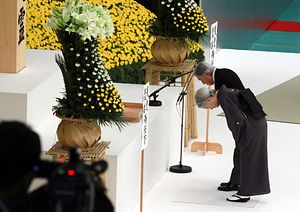Japan’s 73rd ceremony commemorating the end of World War II, held on August 15, was a defining moment for Emperor Akihito, who delivered a final speech to honor the war dead before his abdication next April. In his address, the Emperor reiterated his “deep remorse” for Japan’s wartime aggression.
For three consecutive years, without directly issuing an apology, the words “deep remorse” have graced Emperor Akihito’s two-minute speech, which has also reflected on his efforts to make amends in the Asia-Pacific.
In recent years, meanwhile the contents of Prime Minister Shinzo Abe’s speech has come under increasing scrutiny for subtle changes that tiptoe around outright anti-war rhetoric in favor of pressing ahead with peace leadership, centered on revising Article 9 of the constitution in order to legalize the expansion of Japan’s Self Defense Forces.
Since witnessing the horrors of WWII as a schoolchild, Emperor Akihito has stood by a pacifist agenda and has regularly stressed in public the importance of remembering wartime history. In part, that’s due to his being the last member of the royal family still haunted by memories of a colossal death toll and the aftermath, which saw the emperor bear a sense of guilt and responsibility for a war ordered by his father.
Emperor Akihito is viewed as the face and heart of the nation, known to wear his heart on his sleeve in seeking to undo the damage Japan’s military inflicted on victims in the Asia-Pacific. The Emperor has made extensive war-related visits to battlefields in the Philippines, Palau, Vietnam, and Saipan in his almost 30 year reign. In turn, the imperial family has garnered a new consortium of support from politically left-leaning constituents, while also striking a chord with supporters who wish to preserve Japan’s war-renouncing constitution — an achievement never thought possible in his father’s era.
By contrast, since Abe was elected prime minister in 2012, he has adjusted the wording and tone of his annual speeches by scrapping the more apologetic tone taken by his predecessors and deliberately avoiding mention of Japan’s war crimes. Abe prefers instead to renew a future peace-orientated promise to never repeat the devastation of war again. In his address this year, Abe swore to move forward without changing Japan’s leadership role in achieving peace by “facing history with humility’”in order to make permanent peace a reality.
However, Abe justified that an ever-changing security environment has made collective self defense needed now more than ever. He noted that the times are changing, and it is no longer possible for only one nation to preserve the peace and stability in the region. In this context, Abe described the U.S.-Japan alliance as a championing force that acts as deterrence, allowing Japan to build on peace diplomacy and positive pacifism.
With Abe eyeing a visit to China in October, in an effort to avoid unnecessary diplomatic backlash and to improve regional relations, a controversial annual visit to Yasukuni Shrine in Tokyo has been cancelled for the sixth consecutive year. Abe opted to send a group of LDP lawmakers in his place to visit the shrine, which honors 2.46 million Japanese war dead, including war criminals.
Emperor Akihito’s wish for Japan’s future progress in securing peace is more and more at odds with the ruling LDP’s long-term vision. As a high-profile peace advocate, Emperor Akihito’s abdication and retirement from public duties is concerning for pacifists. They fear the principles behind pacifism could lose momentum with the generational shift to heir Crown Prince Naruhito, who despite sharing a similar attitude has never experienced the hardships of war.































